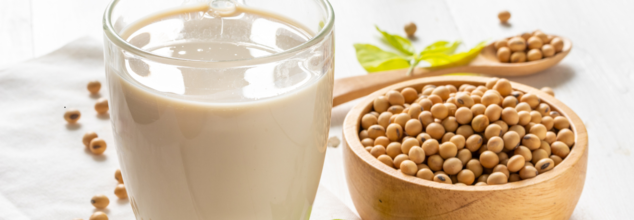- Health Conditions A-Z
- Health & Wellness
- Nutrition
- Fitness
- Health News
- Ayurveda
- Videos
- Medicine A-Z
- Parenting
Is Soy A Healthy Addition To Your Diet?

Soy and Health Benefits (Credit - Canva)
Soy comes from the soybean plant, is a versatile ingredient packed with nutrients. It's a rich source of protein, fiber, vitamins, and minerals. Soy foods have been a staple in Asian cuisine for centuries and are gaining popularity worldwide due to their numerous health benefits. Over the years, concerns have come up about the potential negative effects of having soy. Some people worry that soy might disrupt their hormone levels or increase the risk of certain cancers. However, scientific research has time and time again shown that these concerns are unfounded. Soy is generally safe for most people and can be a valuable part of a healthy diet.
Is Soy Actually Good For You?
There have been many rumors swirling around that Soy may not be as good for your health as many people believe. The Frontiers study 2022 looked at the link between soy intake and cancer risk. Researchers analyzed data from many studies to see if eating more soy, soy isoflavones (plant compounds found in soy), or soy protein could reduce the risk of cancer.
They found that people who ate more soy, especially those who consumed more soy isoflavones, had a lower risk of developing cancer overall. This was particularly true for lung cancer and prostate cancer. However, there was no significant link between soy intake and reduced cancer death rates. The researchers concluded that the beneficial effects of soy on cancer risk are likely due to the soy isoflavones. They suggest that including soy in a healthy diet may help reduce the risk of cancer.
Health Benefits Of Soy
According to Web MD soybeans are a versatile and nutritious food source, particularly beneficial for vegetarians and vegans. Unlike many plant-based proteins, soy contains all nine essential amino acids, making it a complete protein. This means it provides the building blocks your body needs to repair and build tissues.
Heart-Healthy Benefits
Soy is a heart-healthy food. It's low in saturated fat and high in polyunsaturated fats, which can help lower cholesterol levels and reduce the risk of heart disease. Additionally, soy is naturally cholesterol-free and can help lower LDL ("bad") cholesterol.
Digestive Health
Soybeans are a good source of fiber, which aids in digestion and promotes regularity. Fiber can also help lower cholesterol levels.
Mineral-Rich
Soy is packed with essential minerals, including potassium and iron. Potassium is crucial for heart health and nerve function, while iron is essential for oxygen transport in the blood.
Potential Hormonal Benefits
Soy contains compounds called isoflavones, which have weak estrogen-like effects. Some studies suggest that isoflavones may offer benefits for women, such as reducing menopausal symptoms and potentially lowering the risk of certain cancers.
GMO Concerns
Many soybeans are genetically modified (GMO) to improve their yield and resistance to pests and herbicides. While GMO foods are generally considered safe, some people have concerns about their long-term effects.
How To Add Soy To Our Diet
According to University of California San Fransisco there are various ways to add soy to your diet. Tofu, tempeh, and textured vegetable protein are versatile soy-based ingredients that can be used to create a variety of delicious and nutritious meals. You can add them to soups, stews, and chili for a protein boost. Grill them for a smoky flavor or use them as a meat substitute in dishes like meatloaf and tacos. Tofu can also be marinated and used as a snack, blended into creamy dips, or substituted for ricotta cheese in pasta dishes. Soy-based sausages, burgers, and hot dogs are great plant-based alternatives to traditional meat products.
California Mushroom Poisoning: 4 Dead, 3 Receive Liver Transplant

Credits: Canva
California mushrooms poisoning has led to four deaths and three people who required liver transplant. This happened after people consumed the death cap mushroom that is proliferating in California following a rainy winter.
The California Department of Public Health has urged people to avoid mushroom foraging altogether as death cap mushrooms could easily be confused with the safe and edible ones.
California Mushroom Poisoning: How Many Cases So Far?
Since November 18, 2025, there have been more than three dozens cases of death cap poisoning. This included three people getting liver transplants, confirmed the health department. Among the cases, four were also reported to be dead. Some of whom sought medical attention suffered from rapidly evolving acute liver injury and liver failure. Other patients were required to be admitted in intensive care units. The patients age ranged from 19 months to 67 years old.
California Mushroom Poisoning: What Is The Death Cap Mushroom?
The death cap mushroom is the most poisonous mushrooms in the world. It is part of a small group of mushrooms that contain amatoxins, which are highly potent compounds and cause 90% of fatal mushroom poisoning globally. They could be found in city parks, forests, and often under oak trees.
Dr Craig Smollin, medical director for the San Francisco Division of the California Poison Control System tells PBS News that in a year, there are between two to five death cap poisonings.
"The main thing this year is just the magnitude, the number of people ingesting this mushroom," Smollin said. "Having almost 40 is very unusual."
With warm temperature along with early rains, a 'super bloom' of death caps in California could be seen.
Experts point out that eating even a small amount could be fatal. The confusing part is that the color is usually not a reliable way to detect toxicity. Furthermore, whether the mushroom is consumed raw, dried or cooked, does not make a difference.
California Mushroom Poisoning: A Case Study
Speaking to San Francisco Chronicle, Laura Marcelino, 36, said that her family in the Northern California town of Salinas gathered mushrooms that looks like the ones she and her husband used to forage in their native Oaxaca. "We thought it was safe".
However, the next day, her husband felt dizzy, but Marcelino was fine. They ate the mushrooms again, heating them up in a soup with tortillas. Her kids do not like mushrooms, so they were safe, as they did not have any. The next day, she and her husband became ill with vomiting, and stayed home form work.
Marcelino spent five days in a hospital, while her husband underwent a liver transplant.
In an email response to The Associated Press, the US Poison Centers said that the cases of mushroom exposure have increased, and not just the death cap. This increase was noted from September through January by 40% from the same period in the previous year. Exposure do not always result in illness or poisoning.
California Mushroom Poisoning: Common Symptoms
- Cramping
- Nausea
- Diarrhea
- Vomiting
Experts point out that early symptoms could go away within a day, but serious to fatal liver damage can still develop within 2 to 3 days
How Much Water Should Your Child Be Drinking?

Credit:Canva
Been wondering if your child has been consuming too much or too little water each day?
According to Dr Keerti Kulkarni, a Telangana-based pediatrician, toddlers should be consuming about 100ml per kg of water every day, school children should drink up to 90ml per kg and teenagers should take in up to 60ml per kg.
In a lengthy Instagram post, she noted that about 20 percent of their daily required water intake comes from food includng fruits, vegetables, soups and parents should be mindful not to provide children with excess water.
Dr Kulkarani also said that there are exceptions for underweight children who have any other medical issues, such as kidney problems or if they are on any regular medication.
The expert warned: "Breastfed or formula-fed babies do not need extra water before solid foods and giving extra water to young infants can be dangerous and may cause low sodium levels."
What Are Signs Of Dehydration In Children?
Dehydration occurs when the body loses more fluids than it takes in, impairing normal function. In children, signs include:
- Dry or sticky mouth
- Few or no tears when crying
- Eyes that look sunken
- In babies, the soft spot (fontanelle) on top of the head looks sunken
- Darker pee, peeing less or fewer wet diapers than usual
- Crankiness
- Drowsiness or dizziness
- Rapid heartbeat
Why Is Drinking Excessive Water Dangerous?
Drinking excessive water can lead to water intoxication, causing symptoms like confusion, nausea, and seizures; severe cases may be fatal. Water intoxication, also termed hyperhydration, water poisoning or water toxaemia, develops when an individual drinks much more water than the kidneys can excrete.
The main function of the kidneys in the human body is the processing and excretion of excess water. However, the human kidneys can process only up to 0.8 to 1.0L of water at a time. Drinking an amount that exceeds this may overwhelm the kidneys and put the electrolyte balance out of sync in the human body.
Electrolytes, especially sodium, are essential in maintaining fluid balance within and outside cells. Hyponatremia is a condition in which sodium levels fall below 135 mmol/L, resulting from excessive water intake. This causes water to shift into cells, swelling them. In the brain, this can cause severe complications, including coma or even death.
Symptoms of water intoxication vary from mild to severe. Early symptoms are often similar to dehydration, which makes self-diagnosis challenging. Common symptoms include:
- Headaches
- Nausea and vomiting
- Muscle cramps or weakness
- Fatigue or drowsiness
- Confusion and disorientation
This Widely Used Supplement Can Reduce Anger, Study Shows

Credit: Canva
Eating omega-3-rich foods can reduce your aggression levels by 28 percent, an Aggression and Violent Behavior study suggests.
After analyzing 29 randomized controlled trials involving 3,918 participants in total, researchers from the University of Pennsylvania concluded that the fish oil supplement can reduce both reactive anger (in response to provocation) and proactive anger (behavior planned in advance) in people regardless of age, gender, medical diagnosis and length and dosage of treatment.
Neurocriminologist Dr Adrian Raine said of the results: "I think the time has come to implement omega-3 supplementation to reduce aggression, irrespective of whether the setting is the community, the clinic, or the criminal justice system.
"At the very least, parents seeking treatment for an aggressive child should know that in addition to any other treatment that their child receives, an extra portion or two of fish each week could also help."
The scientists theorized that omega-3 can reduce brain inflammation and regulate vital brain functioning which helps maintain aggression levels. However, they also noted that further research was needed to understand the link.
"Omega-3 is not a magic bullet that is going to completely solve the problem of violence in society. But can it help? Based on these findings, we firmly believe it can, and we should start to act on the new knowledge we have." Dr Raine said.
What Are Fish Oil Omega-3s?
Omega-3 fatty acids are polyunsaturated fats known for their crucial role in brain function and overall mental health. Fish oil is particularly rich in EPA and DHA, which are vital components of cell membranes and have strong anti-inflammatory effects in the body.These omega-3s play a critical role in human development, and they are primarily found in fatty fish and fish oil. Since many people do not consume enough fish, supplementation is often recommended to ensure adequate intake of these essential fatty acids.
Although the body can convert another type of omega-3, alpha-linolenic acid (ALA), into EPA and DHA, this process is not highly efficient. As a result, fish oil supplements may provide a convenient way to ensure optimal levels of omega-3s.
READ MORE: NHS Doctor Says This Oil Instead of Cod Liver Is The Best Omega-3 Source
Some popular sources of Omega-3 include:
- Salmon
- Cod Liver Oil
- Algae Oil
- Oysters
- Nuts and seeds, such as flaxseeds, chia seeds, and walnuts
- Plant oils, such as flaxseed oil, soybean oil, and canola oil
- Fortified foods, such as eggs, yogurt, juices, milk, etc.
How Omega-3s Improve Brain Health
EPA and DHA are essential for maintaining brain function throughout life. These fatty acids are abundant in the brain's cell membranes, helping to preserve cell health and facilitate communication between brain cells.
Research has shown that a lack of omega-3 can lead to cognitive impairments. In animal studies, diets deficient in omega-3s resulted in reduced DHA levels in the brain, leading to deficits in learning and memory. In older adults, lower DHA levels have been linked to a smaller brain size, which may indicate accelerated brain ageing.
Maintaining sufficient levels of omega-3s can help support cognitive function and may reduce the risk of age-related brain decline.
The optimal dosage varies, but research suggests that 1,000–2,000 mg of omega-3 fatty acids from fish oil daily is a good starting point. People with depression should look for supplements with higher EPA content. It is pertinent to note that people should consult health experts before starting fish oil supplementation.
Budget 2026: Cheaper Fish In India
Earlier this month, Finance Minister Nirmala Sitharaman announced a surprising tax reduction for India's fishers and marine industry, and experts say it is good news for you too.
Until now, fish caught by Indian vessels beyond territorial waters and brought back to the country for mass consumption has been treated as import, attracting customs duties and integrated goods and services tax (GST).
The combined tax burden raises costs and compliance issues, which discouraged people from deep-sea and exclusive economic zone (EEZ) fishing as well as
However, during her Union Budget 2026 presentation, Sitharaman proposed that fish caught in the EEZ and high seas by Indian fishing vessels are treated as duty-free when brought into Indian ports and treated as exports when landed at foreign ports.
This means that the market availability for Omega-3 packed fishes including salmon, mackerel, tuna, herring and sardines will significantly increase as their existing steep prices see a tremendous fall.
© 2024 Bennett, Coleman & Company Limited

